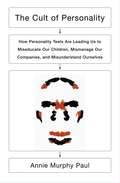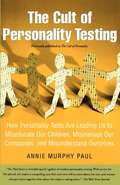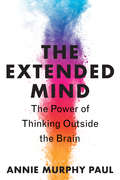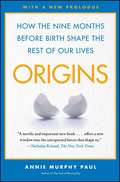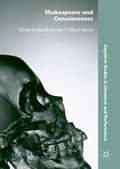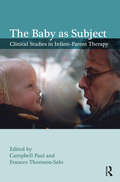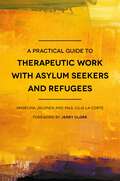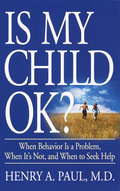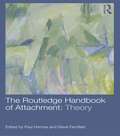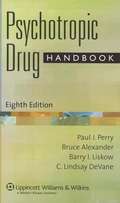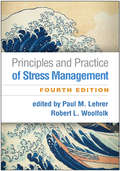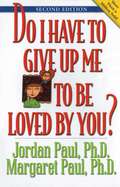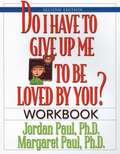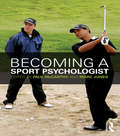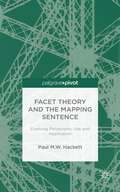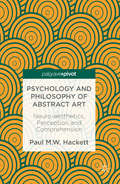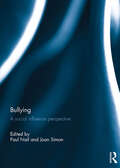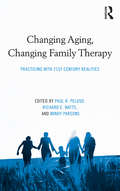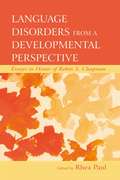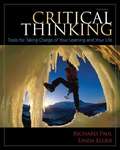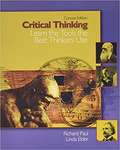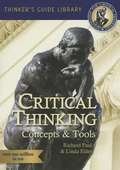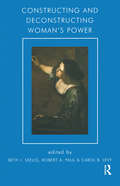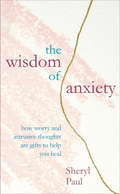- Table View
- List View
The Cult of Personality
by Annie Murphy PaulMillions of Americans take personality tests each year: to get a job, to pursue an education, to settle a legal dispute, to better understand themselves and others. But where did these tests come from, and what are they saying about us? In The Cult of Personality, award-winning psychology writer Annie Murphy Paul reveals the surprising and disturbing story behind the tests that claim to capture human nature. Combining cutting-edge research, engaging reporting, and absorbing history, Paul uncovers the way these allegedly neutral instruments are in fact shaped by the agendas of industry and government. She documents the dangers of their intrusive questions, biased assumptions, and limiting labels. And she exposes the flawed theories and faulty methods that render their results unreliable and invalid. Personality tests, she contends, produce descriptions of people that are nothing like human beings as they actually are: complicated, contradictory, changeable across time and place. The widespread use of these tests has deeply troubling consequences. Students are being consigned to narrow categories even as they're still growing and developing. Workers are having their privacy invaded and their rights trampled. Companies are wasting hundreds of millions of dollars, only to make ill-informed decisions about hiring and promotion. Our judicial system is being undermined by inaccurate evidence. Perhaps most distressing, we are all increasingly implicated in a "cult of personality" that celebrates the superficial over the substantive, the static over the dynamic, the standard and average over the distinctive and unique. Compelling and insightful, this book is an eye-opening account of a collision among the needs of business and bureaucracy, the imperatives of a lucrative and largely unregulated testing industry, and the eternal human desire to make sense of ourselves and each other.
The Cult of Personality Testing
by Annie Murphy PaulThis book tells the surprising and disturbing story of the tests that claim to capture human nature. It goes behind the scenes to discover how personality tests are used in America's companies, its courts, its schools, and in organizations from churches to community centers to dating services. It exposes the serious flaws of personality tests, explaining why their results are often invalid, unreliable, and unfair.
The Extended Mind: The Power of Thinking Outside the Brain
by Annie Murphy PaulA bold new book reveals how we can tap the intelligence that exists beyond our brains—in our bodies, our surroundings, and our relationshipsUse your head. That&’s what we tell ourselves when facing a tricky problem or a difficult project. But a growing body of research indicates that we&’ve got it exactly backwards. What we need to do, says acclaimed science writer Annie Murphy Paul, is think outside the brain. A host of &“extra-neural&” resources—the feelings and movements of our bodies, the physical spaces in which we learn and work, and the minds of those around us— can help us focus more intently, comprehend more deeply, and create more imaginatively. The Extended Mind outlines the research behind this exciting new vision of human ability, exploring the findings of neuroscientists, cognitive scientists, psychologists, and examining the practices of educators, managers, and leaders who are already reaping the benefits of thinking outside the brain. She excavates the untold history of how artists, scientists, and authors—from Jackson Pollock to Jonas Salk to Robert Caro—have used mental extensions to solve problems, make discoveries, and create new works. In the tradition of Howard Gardner&’s Frames of Mind or Daniel Goleman&’s Emotional Intelligence, The Extended Mind offers a dramatic new view of how our minds work, full of practical advice on how we can all think better.
Origins: How the Nine Months Before Birth Shape the Rest of Our Lives
by Annie Murphy PaulWhat makes us the way we are? Some say it's the genes we inherit at conception. Others are sure it's the environment we experience in childhood. But could it be that many of our individual characteristics--our health, our intelligence, our temperaments--are influenced by the conditions we encountered before birth?That's the claim of an exciting and provocative field known as fetal origins. Over the past twenty years, scientists have been developing a radically new understanding of our very earliest experiences and how they exert lasting effects on us from infancy well into adulthood. Their research offers a bold new view of pregnancy as a crucial staging ground for our health, ability, and well-being throughout life.Author and journalist Annie Murphy Paul ventures into the laboratories of fetal researchers, interviews experts from around the world, and delves into the rich history of ideas about how we're shaped before birth. She discovers dramatic stories: how individuals gestated during the Nazi siege of Holland in World War II are still feeling its consequences decades later; how pregnant women who experienced the 9/11 attacks passed their trauma on to their offspring in the womb; how a lab accident led to the discovery of a common household chemical that can harm the developing fetus; how the study of a century-old flu pandemic reveals the high personal and societal costs of poor prenatal experience. Origins also brings to light astonishing scientific findings: how a single exposure to an environmental toxin may produce damage that is passed on to multiple generations; how conditions as varied as diabetes, heart disease, and mental illness may get their start in utero; why the womb is medicine's latest target for the promotion of lifelong health, from preventing cancer to reducing obesity. The fetus is not an inert being, but an active and dynamic creature, responding and adapting as it readies itself for life in the particular world it will enter. The pregnant woman is not merely a source of potential harm to her fetus, as she is so often reminded, but a source of influence on her future child that is far more powerful and positive than we ever knew. And pregnancy is not a nine-month wait for the big event of birth, but a momentous period unto itself, a cradle of individual strength and wellness and a crucible of public health and social equality.With the intimacy of a personal memoir and the sweep of a scientific revolution, Origins presents a stunning new vision of our beginnings that will change the way you think about yourself, your children, and human nature itself.
Origins: How the Nine Months Before Birth Shape the Rest of Our Lives
by Annie Murphy PaulWhat makes us the way we are? Some say it's the genes we inherit at conception. Others are sure it's the environment we experience in childhood. But could it be that many of our individual characteristics--our health, our intelligence, our temperaments--are influenced by the conditions we encountered before birth? That's the claim of an exciting and provocative field known as fetal origins. Over the past twenty years, scientists have been developing a radically new understanding of our very earliest experiences and how they exert lasting effects on us from infancy well into adulthood. Their research offers a bold new view of pregnancy as a crucial staging ground for our health, ability, and well-being throughout life. Author and journalist Annie Murphy Paul ventures into the laboratories of fetal researchers, interviews experts from around the world, and delves into the rich history of ideas about how we're shaped before birth. She discovers dramatic stories: how individuals gestated during the Nazi siege of Holland in World War II are still feeling its consequences decades later; how pregnant women who experienced the 9/11 attacks passed their trauma on to their offspring in the womb; how a lab accident led to the discovery of a common household chemical that can harm the developing fetus; how the study of a century-old flu pandemic reveals the high personal and societal costs of poor prenatal experience. Origins also brings to light astonishing scientific findings: how a single exposure to an environmental toxin may produce damage that is passed on to multiple generations; how conditions as varied as diabetes, heart disease, and mental illness may get their start in utero; why the womb is medicine's latest target for the promotion of lifelong health, from preventing cancer to reducing obesity. The fetus is not an inert being, but an active and dynamic creature, responding and adapting as it readies itself for life in the particular world it will enter. The pregnant woman is not merely a source of potential harm to her fetus, as she is so often reminded, but a source of influence on her future child that is far more powerful and positive than we ever knew. And pregnancy is not a nine-month wait for the big event of birth, but a momentous period unto itself, a cradle of individual strength and wellness and a crucible of public health and social equality.With the intimacy of a personal memoir and the sweep of a scientific revolution, Origins presents a stunning new vision of our beginnings that will change the way you think about yourself, your children, and human nature itself.
Shakespeare and Consciousness (Cognitive Studies in Literature and Performance)
by Paul Budra and Clifford WerierThis book examines how early modern and recently emerging theories of consciousness and cognitive science help us to re-imagine our engagements with Shakespeare in text and performance. Papers investigate the connections between states of mind, emotion, and sensation that constitute consciousness and the conditions of reception in our past and present encounters with Shakespeare’s works. Acknowledging previous work on inwardness, self, self-consciousness, embodied self, emotions, character, and the mind-body problem, contributors consider consciousness from multiple new perspectives—as a phenomenological process, a materially determined product, a neurologically mediated reaction, or an internally synthesized identity—approaching Shakespeare’s plays and associated cultural practices in surprising and innovative ways.
The Baby as Subject: New Directions In Infant-parent Psychotherapy From The Royal Children's Hospital, Melbourne
by Campbell Paul Frances Thomson-SaloThis book is a collection of papers by clinicians united in their conviction about the importance of directly engaging and interacting with the baby in the presence of the parents whenever possible. This approach, which draws on the work of Winnicott, Trevarthen and Stern, honours the baby as subject. It re-presents the baby to the parents who may in that way see a new child, in turn shaping the infant's implicit memories and reflective thinking. Recent neurobiological, attachment and developmental psychology models inform the work. The book describes the underpinning theoretical principles and the settings and forms of direct clinical practice, ranging from work with acutely ill babies, to more everyday interventions in crying, feeding and sleeping difficulties, as well as infant-parent psychotherapy. Clinicians at The Royal Children's Hospital Melbourne from the disciplines of psychiatry, psychoanalysis, psychology, nursing, speech pathology, child psychotherapy, paediatrics, and music therapy describe their work with ill and suffering babies and their families.
A Practical Guide to Therapeutic Work with Asylum Seekers and Refugees
by Paul Cilia La Corte Angelina Jalonen Jerry CloreThe need to support refugees has never been more urgent, but how can everyone working with them provide consistently effective care? Written for a range of professionals including therapists, teachers, social workers, housing support workers and healthcare professionals, this essential guide offers a holistic, person-centred framework to ensure that all those working with refugees to provide them with excellent support. Informed by the authors' direct work with refugees, the book starts with a comprehensive introduction to understanding the underlying issues that lead to the complex needs of an asylum seeking client group. Using an easy-to-follow 'what?', 'why?' and 'how?' structure, within the four key phases of refugee experience. It also shows professionals how to sensitively address trauma, loss and separation with clients who are adjusting to a foreign culture and language using three core principles (therapeutic relationship, bearing witness and psycho-education). Informed and accessible, this guide will help you create a safe, welcoming environment for asylum seekers in all stages of their journey to improve their psychosocial wellbeing and mental health.
Is My Child OK? When Behavior Is a Problem, When It's Not, and When to Seek Help
by Henry A. PaulMy kindergartner insists on wearing the same dress day after day. What should I do? My twelve-year-old is a target of the class bully. Should I intervene? My four-year-old is coming home with other kids' toys in his pocket. Should I be concerned? Is my child normal? Every parent has asked the question at one time or another. Now this wise and compassionate guide, written by an expert in children's mental health, offers reassuring words for worried parents--plus concrete ways to spot the difference between a normal stage of development... and a true problem. In most cases, childhood problems will clear up with a healthy dose of common sense and loving parental attention. But sometimes professional help or medication is needed. This one-stop reference book--organized by symptom and covering everything from tantrums to learning disorders--tells parents what's "normal," what's not, how best to help your child through a rocky period, and when to get an expert's help. Discover: How much fighting between siblings is "normal" (page 94) What to do if your child is the class bully--or the victim of a bully (page 89) How to determine if your child has ADD--or if he's just a little more active and a little less patient (page 106) Tough questions parents must ask themselves when they're dealing with chronic separation anxiety (page 37) How to help a child who suddenly refuses to go to school (page 124) The growing concern surrounding childhood eating disorders (page 172) And much more.
The Routledge Handbook of Attachment: Theory
by Paul Holmes and Steve FarnfieldThe Routledge Handbook of Attachment: Theory provides a broadly based introduction to attachment theory and associated areas, written in an accessible style by experts from around the world. The book covers the basic theories of attachment and discusses the similarities and differences of the two predominant schools of attachment theory. The book provides an overview of current developments in attachment theory, explaining why it is important not only to understanding infant and early child development but also to adult personality and the care we provide to our children. The Routledge Handbook of Attachment: Theory provides detailed descriptions of the leading schools of attachment theory as well as discussions of this potentially confusing and contentious area, and includes a chapter on the neuropsychological basis of attachment. The book also examines other domains and diagnoses that can be confused with issues of attachment and assesses contexts when different approaches may be more suitable. Providing a comprehensive yet accessible introduction to the theories of attachment, The Routledge Handbook of Attachment: Theory is an indispensable guide for professionals working with children and families in community and court-based settings, clinical psychologists, psychiatrists and social workers, clinicians in training and students.
Psychotropic Drug Handbook
by Paul J. Perry; Bruce Alexander; Barry I. Liskow; C. Lindsay DeVaneThis succinct handbook provides students and practitioners with clinically relevant psychotropic drug information. The Eighth Edition is designed as a reference text that also teaches by delivering informative narrative text under standard headlines with references. Its focus goes beyond drug information to cover pharmacotherapy applications. <p><p> The book provides detailed, well-referenced, evidence-based information on a wide range of psychotropic drugs, including mood stabilizers, antidepressants, and antianxiety agents. This edition has new chapters on pediatric and geriatric psychopharmacotherapy; new content on antipsychotics, hypnotics, medications used in treating alcoholism and substance dependence, and electroconvulsive therapy; and new algorithms, appendices, and tables.
Principles and Practice of Stress Management, Fourth Edition
by Paul M. Lehrer, Robert L. WoolfolkThe leading clinical reference and text on stress management has now been significantly revised with 60% new material reflecting key developments in the field. Foremost experts review the "whats," "whys," and "how-tos" of progressive relaxation, biofeedback, meditation, hypnosis, cognitive methods, and other therapies. Chapters describe each method's theoretical foundations, evidence base, procedures, applications, and contraindications. Assessment and implementation are illustrated with extensive case examples. The volume examines the effects of stress on both mind and body, from basic science to practical implications for everyday life and health care. New to This Edition *Greatly expanded evidence base--every method is now supported by controlled clinical research. *Advances in knowledge about stress and the brain are integrated throughout. *Chapter on children and adolescents. *Chapter on selecting the best methods for individual patients. *Chapter on hyperventilation and carbon dioxide biofeedback. *Chapter on neuroinflammation.
Do I Have to Give Up Me to Be Loved by You: Second Edition
by Margaret Paul Jordan PaulThis classic text for couples interested in creating freer, more joyful, and profoundly intimate relationships explores the delicate balance of being true to oneself and being loved by another.Newly updated by the authors, here is the classic text for couples interested in creating freer, more joyful, and profoundly intimate relationships. In their best-selling book about couple relationships, Jordan Paul and Margaret Paul explore the delicate balance of being true to oneself and being loved by another. While couples think they are fighting about money, sex, or time, the authors reveal how such conflicts are almost always more deeply rooted and related to issues of self-protection. Offering a solid framework for conflict resolution, the authors guide couples in working through fears and false beliefs that can block the expression of loving feelings. Stories of couples and examples of dialogue validate readers- feelings and experiences.Key features and benefitsa proven best-sellerhighly recommended by marriage therapistsincludes exercises for couples to explore core beliefs and values
Do I Have to Give Up Me to Be Loved by You Workbook: Workbook - Second Edition
by Margaret Paul Jordan PaulA companion to the best-selling book of the same title, this popular, newly revised workbook helps couples create a deeply satisfying, more intimate relationship.A companion to the best-selling book of the same title, this popular, newly revised workbook helps couples create a deeply satisfying, more intimate relationship. Focusing on the ever-present dynamic of conflict-and the process of working through it-the authors guide couples in getting to the root of recurring disagreements and destructive behaviors. Self-assessment exercises and couple activities help readers recognize unloving responses, move past fear, identify self-protective and negative beliefs, break down power struggles, and reach out in forgiveness. The principles outlined in this powerful, easy-to-use workbook have helped thousands of couples and families create more loving relationships.Key features and benefitsa proven best-sellerhighly recommended by marriage therapistsincludes exercises for couples to explore core beliefs and values
Becoming a Sport Psychologist
by Paul McCarthy and Marc JonesSport psychology is a competitive profession with rigorous and demanding entry routes in terms of education, training and accreditation. Once qualified, the sport psychology practitioner will face complex, day-to-day professional challenges of the kind not always covered in conventional sport psychology textbooks. Becoming a Sport Psychologist is the first book to reveal the reality of working in sport psychology through the personal perspectives and narratives of some of the world’s leading sport psychologists, top professionals with many years experience of working at every level of sport, from amateur to elite, in consulting and support roles, and in sport psychology research. With each chapter focusing on a key issue or issues in professional practice, each contributing psychologist discusses their own education, training and professional experience, their personal motivation and their approach to consulting and delivery, helping the reader to develop a rounded understanding of how to succeed in sport psychology. The book also explores key professional issues such as intervention style, work-life balance and the commercial aspects of sport psychology practice not covered in other books, plus it offers a summary of typical education and training routes and additional information on professional organisations and accreditation schemes. Becoming a Sport Psychologist is invaluable reading for anybody considering a career in sport psychology, or any practising sport psychologist looking to extend and develop their professional skills.
Facet Theory and the Mapping Sentence: Evolving Philosophy, Use and Application
by Paul M.W. HackettHow do we think about the worlds we live in? The formation of categories of events and objects seems to be a fundamental orientation procedure. Facet theory and its main tool, the mapping sentence, deal with categories of behavior and experience, their interrelationship, and their unification as our worldviews. In this book Hackett reviews philosophical writing along with neuroscientific research and information form other disciplines to provide a context for facet theory and the qualitative developments in this approach. With a variety of examples, the author proposes mapping sentences as a new way of understanding and defining complex behavior.
Psychology and Philosophy of Abstract Art
by Paul M.W. HackettThis book examines how we perceive and understand abstract art in contrast to artworks that represent reality. Philosophical, psychological and neuroscience research, including the work of philosopher Paul Crowther, are considered and out of these approaches a complex model is developed to account for this experience. The understanding embodied in this model is rooted in facet theory, mapping sentences and partially ordered analyses, which together provide a comprehensive understanding of the perceptual experience of abstract art.
Bullying: A Social Influence Perspective
by Paul R. Nail and Joan B. SimonThere was a time when bullying was regarded as a relatively innocuous issue—a normal part of growing up—but this is no longer the case. The magnitude of the problems that bullying can lead to is evidenced by the rising amount of professional literature on bullying, as well as recent cases of bully-linked suicide and homicide in the popular media. Bullying always involves at least one bully and one victim, but there are a variety of social roles that can affect the duration and magnitude of bullying. These roles include bully assistants or supporters, victim defenders, and passive bystanders. Fundamental to creating successful intervention programs to prevent or reduce bullying is basic research that identifies the characteristics of those involved in bullying situations (e.g., personality, motivational, intellectual, physical, social, and behavioural). This volume presents a broad range of original research describing how social influences are related to bullying. Reflecting the fact that bullying is a world-wide phenomenon and problem, the research comes from samples of individuals from Australia, Finland, Italy, New England, and Poland, as well as a review of the cyber-bullying literature, which is international in scope. This book was originally published as a special issue of Social Influence.
Changing Aging, Changing Family Therapy: Practicing With 21st Century Realities (Routledge Series on Family Therapy and Counseling)
by Paul R. Peluso - Richard E. Watts - Mindy ParsonsAs the baby boomers move into retirement and later stages of life, gerontology and geriatrics have begun to receive much more attention. Changing Aging, Changing Family Therapy explores the ways in which family therapists’ expertise in systems theory makes them uniquely qualified to take a leading role in helping families and individuals cope with the challenges and changed circumstances that aging brings. Clinicians will find detailed coverage and practical guidelines on a wealth of vital topics, including coping with the illness of a parent or partner, working past retirement age, outliving one’s savings, preserving physical and mental well-being over time, and more.
Language Disorders From a Developmental Perspective: Essays in Honor of Robin S. Chapman (New Directions in Communication Disorders Research)
by Rhea PaulThe last 25 years have witnessed an explosion of research at the intersection of typical language development and child language disorders. A pioneer in bringing these fields of study together is Robin S. Chapman, Emerita, University of Wisconsin. This contributed volume honors her with chapters written by former students and colleagues, who track in their own research the theme of psycholinguistic contributions to our understanding of the nature and remediation of child language disorders. In this volume, such renowned researchers in child language development as Dorothy Bishop, Judith Johnston, and Ray Kent, among others, discuss their research in certain populations in the context of the significance of, limits of, and alternatives to Robin Chapman’s developmental interactionist perspective. Studies of disordered language in Down’s Syndrome and Specific Language Impairment, in particular, attribute much progress in our understanding of the pragmatic and comprehension skills in these populations to the developmental perspective. Language Disorders From a Developmental Perspective opens with a reprint of Robin Chapman’s seminal 2001 article from The Journal of Child Psychiatry and Psychology. It concludes with a new chapter from Dr. Chapman summarizing what we know and what we don’t know about language disorders within the developmental framework, and pointing to future areas of research and intervention. Clinicians as well as scholars will benefit from this book, as will students in programs of developmental psycholinguistics, child language disorders, and learning disabilities.
Critical Thinking: Tools for Taking Charge of Your Learning and Your Life (Third Edition)
by Richard Paul Linda ElderFor Student Success and Career Development, or Critical Thinking courses. Written by two of the leading experts in the field, this book's approach to critical thinking is as a process for taking charge of and responsibility for one’s thinking. Critical Thinking is based in theory developed over the last 30 years, it focuses on an integrated, comprehensive concept of critical thinking that is both substantive and practical; it fosters the development of basic intellectual skills students need to think through content in any class, subject, or discipline, as well as through any problem or issue they face. Simply stated, this text offers students the intellectual tools they need for lifelong learning, and rational, conscientious living. In this edition, several advanced chapters were eliminated, many diagrams have been added or enhanced, and the glossary of critical thinking terms has been more strongly developed.
Critical Thinking: Learn The Tools The Best Thinkers Use
by Richard Paul Linda ElderWritten by two of the leading experts in critical thinking, this book focuses on an integrated, universal concept of critical thinking that is both substantive and applicable to any and every situation in which human thinking is necessary. It provides readerse with the basic intellectual tools needed for life-long learning, helping them understand the mind and how its three functions — thinking, feeling, motivation — influence and are influenced by one another. This book fosters the development of fair-minded critical thinking. Features the intellectual standards: clarity, precision, accuracy, logicalness, significance, depth, breadth, and fairness; The importance of good questioning; and intellectual tools to read for deep and lasting comprehension, and to write in ways that show clarity of reasonability of thought. For all that want to improve their critical thinking skills to apply to their job or life.
The Miniature Guide To Critical Thinking Concepts And Tools
by Richard Paul Linda ElderThis miniature guide, which has sold more than half a million copies, is widely used in teaching and learning, in personal and professional life. It distills the essence of critical thinking into a 24-page, pocket-sized guide. It introduces the interrelated complex of critical thinking concepts and principles implicit in the works of Richard Paul and Linda Elder. This guide is widely used at the college level. It can be used as a critical thinking supplement to any textbook or course.
Constructing and Deconstructing Woman's Power
by Robert A. Paul Beth J. Seelig Carol B. LevyConstructing and Deconstructing Woman's Power explores power and gender issues from a variety of psychoanalytic, as well as social, cultural and philosophical perspectives. The first three papers examine the complex notion of external and internal glass ceiling brought to life by clear and illustrative clinical vignettes. The creation of life, a uniquely female power, is subsequently considered in two fascinating papers exploring motherhood and the conflicts it brings. The development and expression of feminine creativity more generally is further examined in two unique studies. The final three essays address men's relation to women and their power.
The Wisdom of Anxiety: How worry and intrusive thoughts are gifts to help you heal
by Sheryl Paul'We have to shift from a mindset of shame, which sees anxiety as evidence of brokenness, to a mindset of curiosity, which recognizes that anxiety is evidence of our sensitive heart, our imaginative mind and our soul's desire to grow towards wholeness.' Three million people are thought to suffer from anxiety in the UK, and it is an issue that affects a growing number of people across all ages. For anyone troubled by obsessive thoughts, insomnia and other manifestations of anxiety, counsellor Sheryl Paul offers shelter in the storm. In The Wisdom of Anxiety, Paul reveals that anxiety, like any emotion, is a signal - a clear bodily invitation to heal and renew your trust in your choices, self-image and core values. Weaving together practical exercises with personal stories, Paul offers medication-free approaches for accessing the gifts in different kinds of anxiety, and especially the anxiety summoned by life's transitions, for example a career change, becoming parents or becoming carers for loved ones. Chapters include recognising the symptoms of anxiety, its origins, the myth of 'normal', the expectation of happiness and a timeline of healing that includes exercises for the body and mind. There are also chapters on parenting in an age of anxiety and the vulnerability of connection and relationships.
